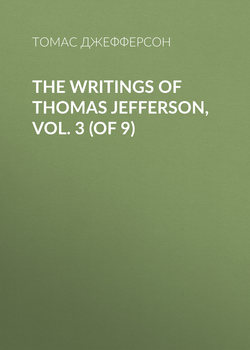Читать книгу The Writings of Thomas Jefferson, Vol. 3 (of 9) - Томас Джефферсон, Thomas Jefferson - Страница 25
PART II.—Continued.
LETTERS WRITTEN WHILE IN EUROPE.
1784-1790
TO JOHN JAY
ОглавлениеParis, June 29, 1789.
Sir,—My letter of the 25th gave you the transactions of the States General to the afternoon of that day. On the next, the Archbishop of Paris joined the Tiers, as did some others of the Clergy and Noblesse. On the 27th, the question of the St. Domingo deputation came on, and it was decided that it should be received. I have before mentioned to you the ferment into which the proceedings at the seance royale of the 23d, had thrown the people. The soldiery also were affected by it. It began in the French guards, extended to those of every other denomination, (except the Swiss) and even to the body guards of the King. They began to quit their barracks, to assemble in squads, to declare they would defend the life of the King, but would not cut the throats of their fellow-citizens. They were treated and caressed by the people, carried in triumph through the streets, called themselves the soldiers of the nation, and left no doubt on which side they would be, in case of a rupture. Similar accounts came in from the troops in other parts of the kingdom, as well those which had not heard of the seance royale, as those which had, and gave good reason to apprehend that the soldiery, in general, would side with their fathers and brothers, rather than with their officers. The operation of this medicine, at Versailles, was as sudden as it was powerful. The alarm there was so complete, that in the afternoon of the 27th, the King wrote a letter to the President of the Clergy, the Cardinal de La Rochefoucault, in these words:1
"My Cousin,—Wholly engaged in promoting the general good of my kingdom, and desirous, above all things, that the Assembly of the States General should apply themselves to objects of general interest, after the voluntary acceptance by your order of my declaration of the 23d of the present month; I pass my word that my faithful Clergy will, without delay, unite themselves with the other two orders, to hasten the accomplishment of my paternal views. Those, whose powers are too limited, may decline voting until new powers are procured. This will be a new mark of attachment which my Clergy will give me. I pray God, my Cousin, to have you in his holy keeping.
Louis."
A like letter was written to the Duke de Luxemburgh, President of the Noblesse. The two chambers entered into debate on the question, whether they should obey the letter of the King. There was a considerable opposition; when notes written by the Count d'Artois to sundry members, and handed about among the rest, decided the matter, and they went in a body and took their seats with the Tiers, and thus rendered the union of the orders in one chamber complete. As soon as this was known to the people of Versailles, they assembled about the palace, demanded the King and Queen, who came and showed themselves in a balcony. They rent the skies with cries of "vive le roy," "vive la reine." They called for the Dauphin, who was also produced, and was the subject of new acclamations. After feasting themselves and the royal family with this tumultuary reconciliation, they went to the house of Mr. Neckar and M. de Montmorin, with shouts of thankfulness and affection. Similar emotions of joy took place in Paris, and at this moment, the triumph of the Tiers is considered as complete. To-morrow they will recommence business, voting by persons on all questions; and whatever difficulties may be opposed in debate by the malcontents of the Clergy and Nobility, everything must be finally settled at the will of the Tiers. It remains to see whether they will leave to the Nobility anything but their titulary appellations. I suppose they will not. Mr. Neckar will probably remain in office. It would seem natural that he should endeavor to have the hostile part of the Council removed, but I question if he finds himself firm enough for that. A perfect co-operation with the Tiers will be his wisest game. This great crisis being now over, I shall not have matter interesting enough to trouble you with, as often as I have done lately. There has nothing remarkable taken place in any other part of Europe. I have the honor to be, with the most perfect esteem and respect, Sir, your most obedient, and most humble servant.
1
A translation is here given.
